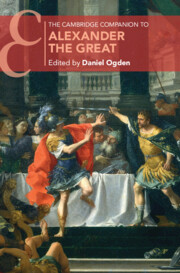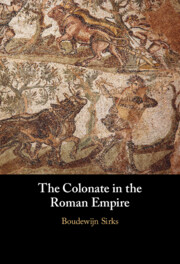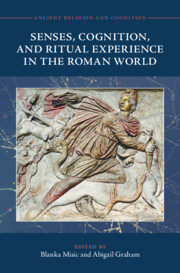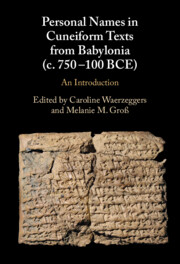Refine search
Actions for selected content:
24618 results in Ancient history
Bibliography
-
- Book:
- The Trojan Horse and Other Stories
- Published online:
- 09 November 2023
- Print publication:
- 11 January 2024, pp 327-352
-
- Chapter
- Export citation
Contents
-
- Book:
- The Trojan Horse and Other Stories
- Published online:
- 09 November 2023
- Print publication:
- 11 January 2024, pp v-v
-
- Chapter
- Export citation
Preface
-
- Book:
- The Trojan Horse and Other Stories
- Published online:
- 09 November 2023
- Print publication:
- 11 January 2024, pp xi-xii
-
- Chapter
- Export citation
Introduction
-
- Book:
- The Trojan Horse and Other Stories
- Published online:
- 09 November 2023
- Print publication:
- 11 January 2024, pp 1-12
-
- Chapter
- Export citation
Chapter 6 - The ‘Trojan’ Boar (Aper troianus ostentator)
-
- Book:
- The Trojan Horse and Other Stories
- Published online:
- 09 November 2023
- Print publication:
- 11 January 2024, pp 135-162
-
- Chapter
- Export citation
Acknowledgements
-
- Book:
- The Trojan Horse and Other Stories
- Published online:
- 09 November 2023
- Print publication:
- 11 January 2024, pp xiii-xiv
-
- Chapter
- Export citation
Chapter 3 - The Lion of Androclus (Panthera leo philanthropus)
-
- Book:
- The Trojan Horse and Other Stories
- Published online:
- 09 November 2023
- Print publication:
- 11 January 2024, pp 63-84
-
- Chapter
- Export citation
Chapter 5 - The Trojan Horse (Equus troianus)
-
- Book:
- The Trojan Horse and Other Stories
- Published online:
- 09 November 2023
- Print publication:
- 11 January 2024, pp 109-134
-
- Chapter
- Export citation
Chapter 1 - The Sphinx (Sphinx aenigmatica)
-
- Book:
- The Trojan Horse and Other Stories
- Published online:
- 09 November 2023
- Print publication:
- 11 January 2024, pp 13-32
-
- Chapter
- Export citation
Chapter 8 - The Socratic Gadfly (Haematopota oxyglotta socratis)
-
- Book:
- The Trojan Horse and Other Stories
- Published online:
- 09 November 2023
- Print publication:
- 11 January 2024, pp 187-208
-
- Chapter
- Export citation
Reviews
-
- Book:
- The Trojan Horse and Other Stories
- Published online:
- 09 November 2023
- Print publication:
- 11 January 2024, pp ii-ii
-
- Chapter
- Export citation
Index
-
- Book:
- The Trojan Horse and Other Stories
- Published online:
- 09 November 2023
- Print publication:
- 11 January 2024, pp 353-356
-
- Chapter
- Export citation

The Cambridge Companion to Alexander the Great
-
- Published online:
- 04 January 2024
- Print publication:
- 18 January 2024

The Colonate in the Roman Empire
-
- Published online:
- 04 January 2024
- Print publication:
- 18 January 2024

Senses, Cognition, and Ritual Experience in the Roman World
-
- Published online:
- 04 January 2024
- Print publication:
- 25 January 2024
-
- Book
-
- You have access
- Open access
- Export citation

Personal Names in Cuneiform Texts from Babylonia (c. 750–100 BCE)
- An Introduction
-
- Published online:
- 02 January 2024
- Print publication:
- 18 January 2024
-
- Book
-
- You have access
- Open access
- Export citation
Part III - Ancient Meets Modern
-
- Book:
- Toxic Masculinity in the Ancient World
- Published by:
- Edinburgh University Press
- Published online:
- 27 January 2026
- Print publication:
- 31 December 2023, pp 183-184
-
- Chapter
- Export citation
Chapter 10 - But She Didn’t Complain: Ovid’s Leucothoe, Rape Myths and Hermeneutical Injustice
-
-
- Book:
- Believing Ancient Women
- Published by:
- Edinburgh University Press
- Published online:
- 24 January 2026
- Print publication:
- 31 December 2023, pp 169-184
-
- Chapter
- Export citation
Chapter 1 - Believing Ancient Women: An Introduction and Feminist Epistemological Field Guide
-
-
- Book:
- Believing Ancient Women
- Published by:
- Edinburgh University Press
- Published online:
- 24 January 2026
- Print publication:
- 31 December 2023, pp 1-29
-
- Chapter
- Export citation
Selected Bibliography
-
- Book:
- Believing Ancient Women
- Published by:
- Edinburgh University Press
- Published online:
- 24 January 2026
- Print publication:
- 31 December 2023, pp 280-318
-
- Chapter
- Export citation
